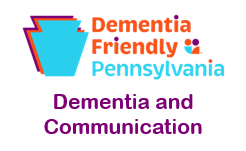
Equipping individuals and communities to be able to meaningfully engage with people living with dementia is a key component of DFA’s mission. In our mutual commitment to foster connection and engagement, DFA is pleased to provide access to the Friends & Family Training on behalf of TimeSlips.
Friends & Family training is free and available to everyone!
TimeSlips for Friends & Family
Approx. 45 minutes
Cost: Free!
TimeSlips is a non-profit committed to ensuring that people have access to meaningful and purposeful engagement regardless of physical or cognitive ability – all the way to the end of life. Founded by MacArthur Fellow Anne Basting 25 years ago, TimeSlips has trained family, friends, and professional caregivers to use their inherent creativity to invite their care partners into meaningful expression.
Extensively researched, the TimeSlips improvisational methodology shows benefits of social connection and improved well-being for both care partners, with particular positive impact on people living with cognitive challenges.
The TimeSlips Friends & Family Training is designed for anyone looking to learn new ways to connect with a loved one experiencing cognitive changes. Created in collaboration with family caregivers, this Friends & Family training takes approximately 45 minutes to complete and will provide you with an introduction to TimeSlips and creative engagement tools that you can put to immediate use. The concepts taught in this module can be infused into any point of care, and will increase opportunities for joy and meaning in your care partnership.
TimeSlips is elated to share these resources with the Dementia Friendly America network!
